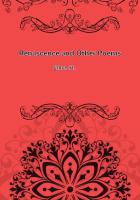The first name in romance, the most ancient and the most enduring, is that of Argive Helen. During three thousand years fair women have been born, have lived, and been loved, "that there might be a song in the ears of men of later time," but, compared to the renown of Helen, their glory is dim. Cleopatra, who held the world's fate in her hands, and lay in the arms of Caesar; Mary Stuart (Maria Verticordia), for whose sake, as a northern novelist tells, peasants have lain awake, sorrowing that she is dead; Agnes Sorel, Fair Rosamond, la belle Stuart, "the Pompadour and the Parabere,"can still enchant us from the page of history and chronicle. "Zeus gave them beauty, which naturally rules even strength itself," to quote the Greek orator on the mistress of them all, on her who, having never lived, can never die, the Daughter of the Swan.
While Helen enjoys this immortality, and is the ideal of beauty upon earth, it is curious to reflect on the modernite of her story, the oldest of the love stories of the world. In Homer we first meet her, the fairest of women in the song of the greatest of poets. It might almost seem as if Homer meant to justify, by his dealing with Helen, some of the most recent theories of literary art. In the "Iliad" and "Odyssey" the tale of Helen is without a beginning and without an end, like a frieze on a Greek temple. She crosses the stage as a figure familiar to all, the poet's audience clearly did not need to be told who Helen was, nor anything about her youth.
The famous judgment of Paris, the beginning of evil to Achaeans and Ilian men, is only mentioned once by Homer, late, and in a passage of doubtful authenticity. Of her reconciliation to her wedded lord, Menelaus, not a word is said; of her end we are told no more than that for her and him a mansion in Elysium is prepared -"Where falls not hail, or rain, or any snow."We leave her happy in Argos, a smile on her lips, a gift in her hands, as we met her in Troy, beautiful, adored despite her guilt, as sweet in her repentance as in her unvexed Argive home. Women seldom mention her, in the epic, but with horror and anger; men never address her but in gentle courtesy. What is her secret? How did she leave her home with Paris--beguiled by love, by magic, or driven by the implacable Aphrodite? Homer is silent on all of these things; these things, doubtless, were known by his audience.
In his poem Helen moves as a thing of ****** grace, courtesy, and kindness, save when she rebels against her doom, after seeing her lover fly from her husband's spear. Had we only Homer, by far our earliest literary source, we should know little of the romance of Helen; should only know that a lawless love brought ruin on Troy and sorrow on the Achaeans; and this is thrown out, with no moral comment, without praise or blame. The end, we learn, was peace, and beauty was reconciled to life. There is no explanation, no denouement; and we know how much denouement and explanations hampered Scott and Shakespeare. From these trammels Homer is free, as a god is free from mortal limitations.
All this manner of telling a tale--a manner so ancient, so original--is akin, in practice, to recent theories of what art should be, and what art seldom is, perhaps never is, in modern hands.
Modern enough, again, is the choice of a married woman for the heroine of the earliest love tale. Apollonius Rhodius sings (and no man has ever sung so well) of a maiden's love; Virgil, of a widow's; Homer, of love that has defied law, blindly obedient to destiny, which dominates even Zeus. Once again, Helen is not a very young girl; ungallant chronologists have attributed to her Iknow not what age. We think of her as about the age of the Venus of Milo; in truth, she was "ageless and immortal." Homer never describes her beauty; we only see it reflected in the eyes of the old men, white and weak, thin-voiced as cicalas: but hers is a loveliness "to turn an old man young." "It is no marvel," they say, "that for her sake Trojans and Achaeans slay each other."She was embroidering at a vast web, working in gold and scarlet the sorrows that for her sake befell mankind, when they called her to the walls to see Paris fight Menelaus, in the last year of the war.
There she stands, in raiment of silvery white, her heart yearning for her old love and her own city. Already her thought is far from Paris. Was her heart ever with Paris? That is her secret. A very old legend, mentioned by the Bishop of Thessalonica, Eustathius, tells us that Paris magically beguiled her, disguised in the form of Menelaus, her lord, as Uther beguiled Ygerne. She sees the son of Priam play the dastard in the fight; she turns in wrath on Aphrodite, who would lure her back to his arms; but to his arms she must go, "for the daughter of Zeus was afraid." Violence is put upon beauty; it is soiled, or seems soiled, in its way through the world. Helen urges Paris again into the war. He has a heart invincibly light and gay; shame does not weigh on him. "Not every man is valiant every day," he says; yet once engaged in battle, he bears him bravely, and his arrows rain death among the mail-clad Achaeans.
What Homer thinks of Paris we can only guess. His beauty is the bane of Ilios; but Homer forgives so much to beauty. In the end of the "Iliad," Helen sings the immortal dirge over Hector, the stainless knight, "with thy loving kindness and thy gentle speech."In the "Odyssey," she is at home again, playing the gracious part of hostess to Odysseus's wandering son, pouring into the bowl the magic herb of Egypt, "which brings forgetfulness of sorrow." The wandering son of Odysseus departs with a gift for his bride, "to wear upon the day of her desire, a memorial of the hands of Helen,"the beautiful hands, that in Troy or Argos were never idle.















